A Hub for Creative Innovation – Ars Electronica Blog (original) (raw)
The Art Thinking Lounge is a platform for transformation through art that offers companies, artists, scientists, activists and citizens a space to explore and discuss future visions through art.
What role does art play in the 21st century and how can we use it to create a better society? Art serves as a catalyst for social change by opening up new perspectives and arousing curiosity to look deeper. The Art Thinking Lounge is a platform that aims to drive change through art. It provides a space where companies, artists, scientists, activists and citizens come into contact with artworks to experience, critique, exchange opinions and discuss visions for the future, with the aim of inspiring a better future.
The Art Thinking Lounge is a new initiative of the Art Thinking program, which was launched in 2014 through a collaboration between Hakuhodo, a Japanese integrated marketing and innovation company, and Ars Electronica. In today’s rapidly evolving technology and media landscape, businesses and local governments face the urgent challenge of adapting to change. This is not just about being innovative, but also about ensuring that these innovations are successfully integrated into society. This is exactly where the work of the Art Thinking Lounge comes in.

Transformation Lounge, Photo: vog.photo
Exploring the Future
The Art Thinking Lounge consists of three main areas: Art Thinking ABC is a playful exhibition that explores what “Art Thinking” is, why it is so important and how it can be practiced. At the Ars Electronica Festival, visitors can try out Art Thinking for themselves with a special toolkit. Art Thinking Inspiration presents artists’ projects that translate Art Thinking into social practice. Art Thinking Prototype is a space where companies connected to the Art Thinking Lounge can present their future visions and prototypes and ask festival visitors for active feedback. Unlike a traditional trade fair where finished products are presented, this space serves as a test environment where prototypes are exhibited and further developed through the suggestions and criticism of the audience. This year’s participants include Hakuhodo Inc, D-LAB Japan Tobacco Inc and Mitsubishi Electric Corporation.
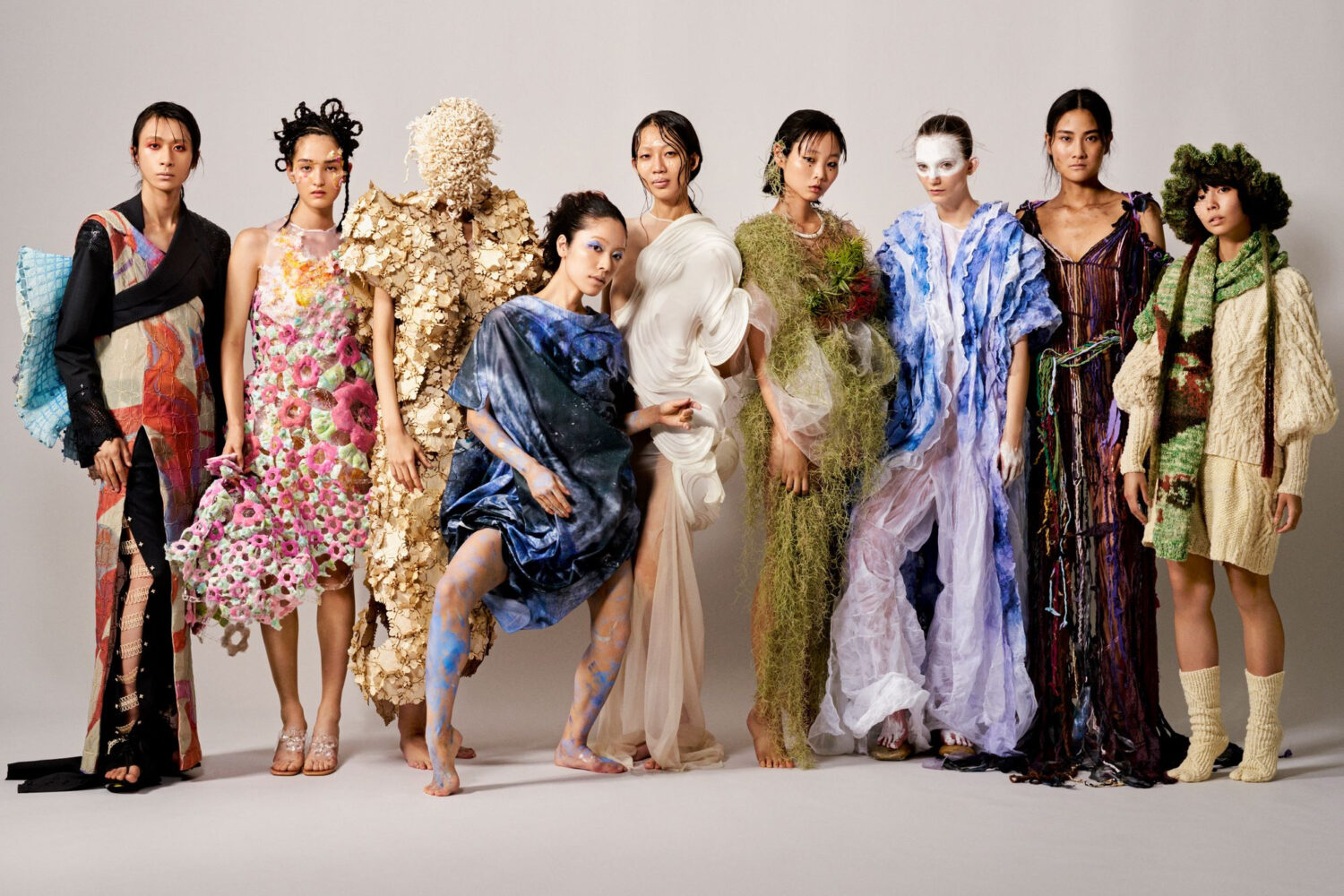
Redefining the future of sustainable fashion
The FASHION FRONTIER PROGRAM, a support program for young designers, is part of the Art Thinking Lounge as “Art Thinking Inspiration” and is under the direction of world-renowned fashion designer Yuima Nakazato. The exhibition presents the works of the winners of the FASHION FRONTIER PROGRAM 2023, which were influenced by extensive research and direct experience. This hands-on approach has enabled the designers to develop a new understanding of value and creativity that is deeply rooted in their connection to materials, artisans and nature – all key elements in the garment making process. The FASHION FRONTIER PROGRAM emphasizes not only the aesthetic beauty of the works, but also the charm of the production process, the concept behind it and the purpose. In a time of mass production and a throwaway society, these designers have found their own answers to the question: Why do we make clothes?
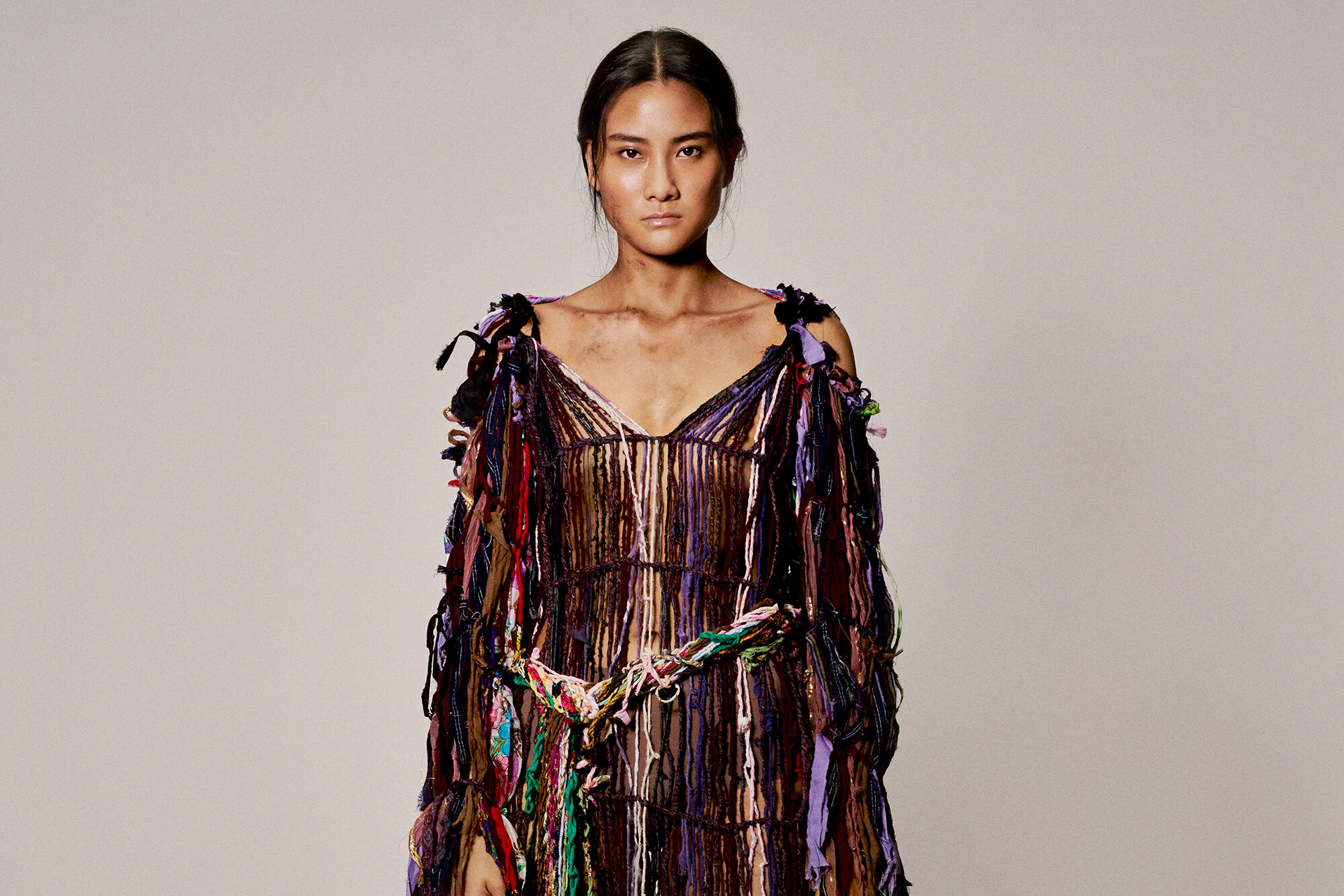
weaving sentimentality, Yu Kawajiri (JP), Credit: Yasunari Kikuma
“Weaving Sentimentality” is an art project by Yu Kawajiri in which lost fabrics of their former owners are unraveled, torn, twisted and rewoven. The aim of the project is to pass on the feelings of sadness and loneliness from the past to the next generation.

Pantha Rhei. Growing colours for flowing waters, Julia Moser (AT), Credit: Yasunari Kikuma
“Pantha Rhei. Growing Colours for Flowing Waters” seeks to emphasize the properties and energy of water through poetic design. The pigments used to dye the clothes come from bacteria extracted from the Danube. This method requires minimal water consumption and does not use harmful chemicals.
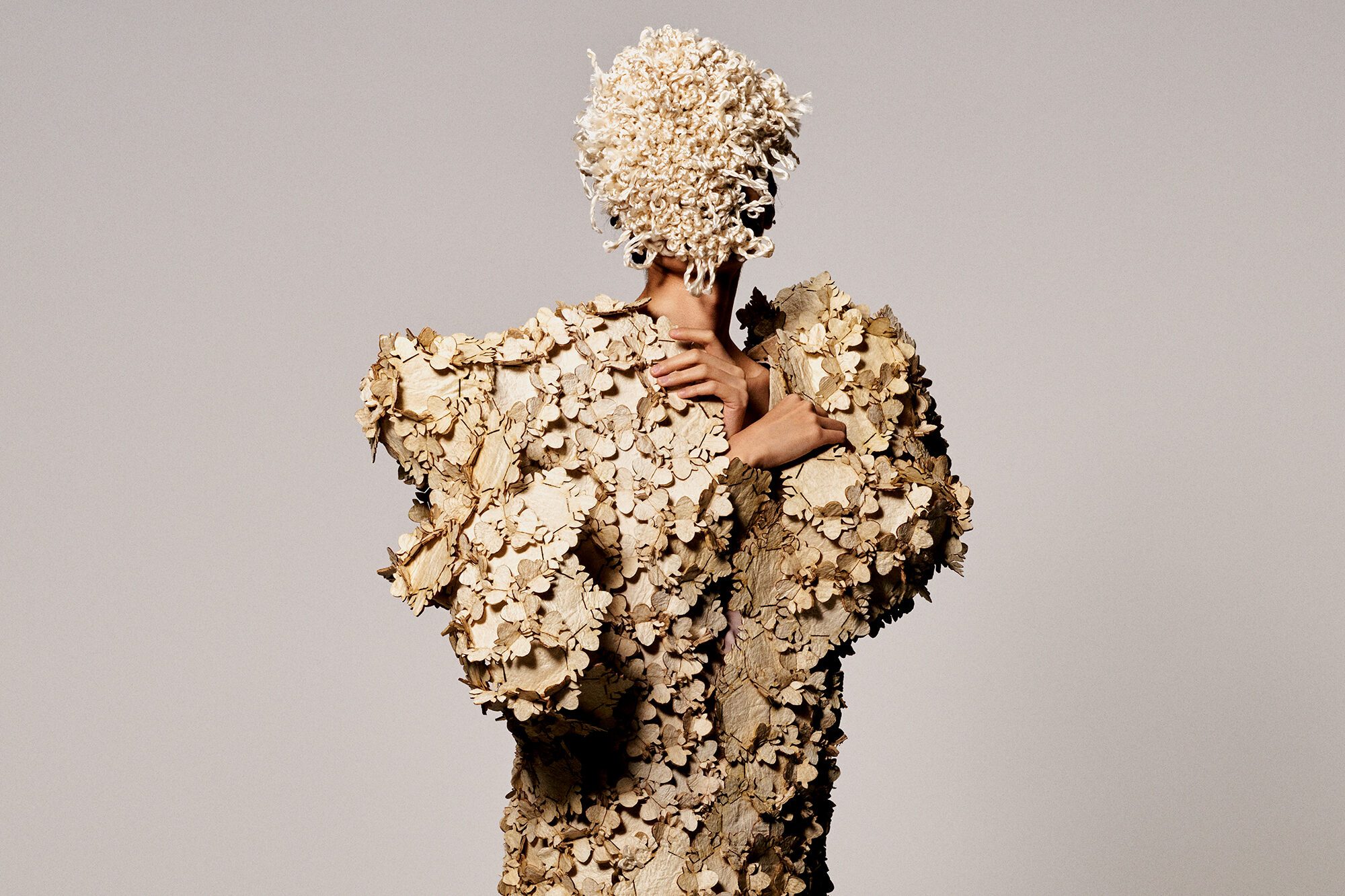
MAYUGOMORI, Hiroto Ikebe (JP), CREDIT. Yasunari Kikuma
“MAYUGOMORI” is a project that focuses on the declining traditions of silkworm rearing in Japan and transforms the production process of silk waste into new materials by combining modern technology with traditional techniques. The aim is to reduce the environmental impact and have a positive influence on the surroundings.
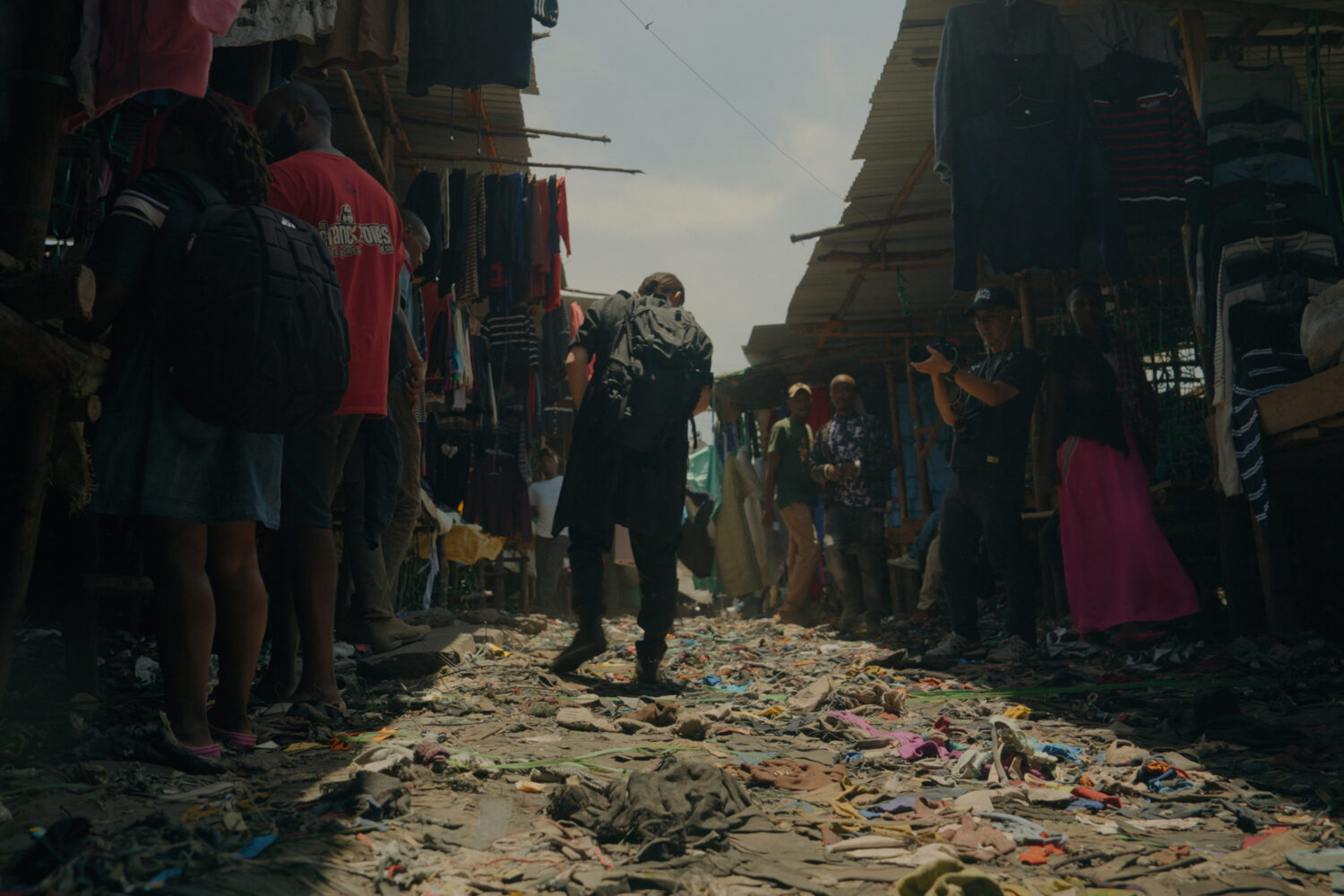
Dust to Dust, Yuima Nakazato (JP), Credit: Yuima Nakazato
Future Pathways
Art Thinking Inspiration will also feature the documentary Dust to Dust by Yuima Nakazato, Japan’s only active haute couture designer. The film documents his journey of transforming discarded fast fashion items from Africa into creations showcased at Paris Fashion Week, made possible through collaborations with various companies. Yuima is leading the future of fashion by blending innovative technologies with traditional materials, aiming to shift the industry away from mass production and toward respect for individuals and the environment. His work, including “Dust to Dust”, is deeply informed by global environmental and production issues, such as the textile waste crisis in Kenya, underscoring the urgent need for conservation and social change.

Fufuly, D-LAB Japan Tobacco Inc. (JP), Photo: Japan Tobacco Inc.
In our fast-paced everyday lives, the constant pressure to have everything under control can leave us feeling mentally and physically overwhelmed. Fufuly offers an innovative solution: a breathing cushion that helps you relax and calm down in the midst of chaos. The cushion imitates a natural breathing rhythm and moves gently, almost as if it were alive. When you hold it in your hands, you are encouraged to match your breathing to this rhythm, based on the biological principle of rhythmic synchronization. This interaction promotes relaxation and reminds you of the importance of taking time for yourself and being present without the pressure of constantly having to control everything. “Fufuly” offers a simple but effective way to find peace and balance in hectic everyday life.
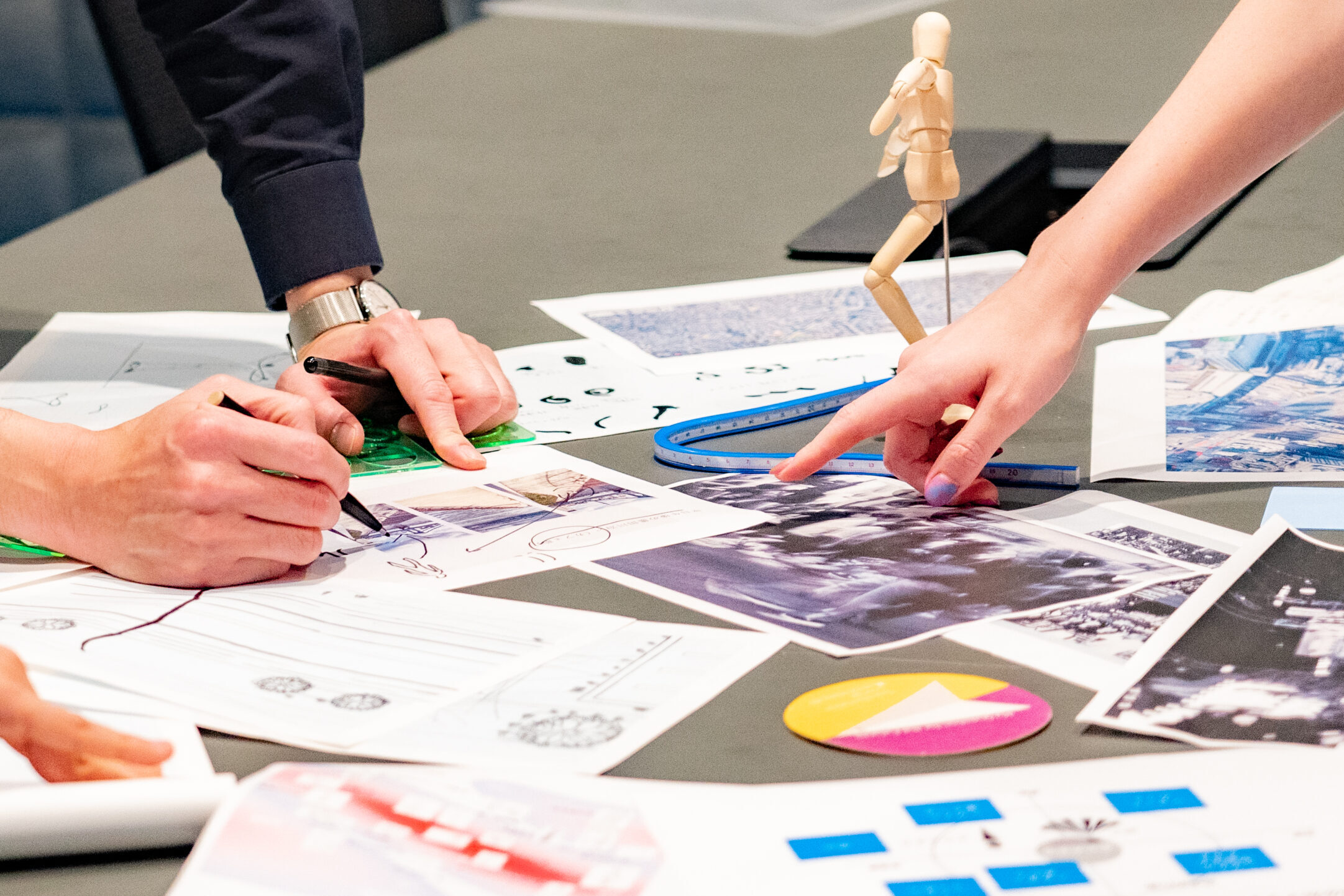
Rhythms of People, Kei Takeuchi (JP), Rena Tanaka (JP), Hokuto Sajiki (JP), Siyu Liu (CN), Amy Yamanoi (JP), Kimitaro Hattori (JP), Photo: Hokuto Sajiki
In our daily lives, we’re guided by patterns and rhythms that often go unnoticed, shaping how we live, work, and connect with others. The Rhythms of People project explores these underlying patterns and their influence on our behavior and communities. By using technology, data visualization, and artistic expression, the project highlights these rhythms, encouraging reflection on their impact on our well-being and society. “Rhythms of People” offers insight into how these rhythms shape both individual and collective experiences.

AI SPEC, photo: Mitsubishi Electric Corporation
AI SPEC is a project designed to make AI ethics more relatable and accessible to everyone by fostering open discussions. As AI technology becomes more integrated into our daily products and services, concerns about AI ethics are becoming more significant. At Mitsubishi Electric, as developers of AI technology, we recognize our responsibility to address these ethical issues directly. This responsibility inspired our designers and AI researchers to create the AI SPEC project.
Interactive Creativity
In the Art Thinking Lounge, festival visitors have the special opportunity to become active participants in the Art Thinking process themselves. The aim here is not just to passively view art, but to actively participate in a creative process. In the Art Thinking ABC, for example, visitors can work with a special toolkit that introduces them to the principles of Art Thinking. This toolkit asks participants to choose an “Art Thinking keyword” that speaks to them and use it as a perspective to explore and reflect on the artworks at the Ars Electronica Festival. Through this exploration, visitors are encouraged to develop their own creative questions, inspired by their personal experiences and insights. Visitors are invited not only to experience the Art Thinking Lounge at this year’s Ars Electronica Festival, but also to imagine the possibilities of setting up a pop-up version of the Lounge in their own company, city or country. Anyone who is intrigued by this concept and would like to explore it further is encouraged to get in touch for more information.
The Art Thinking Lounge can be visited at POSTCITY as part of the Ars Electronica Festival 2024. Tickets are available here.